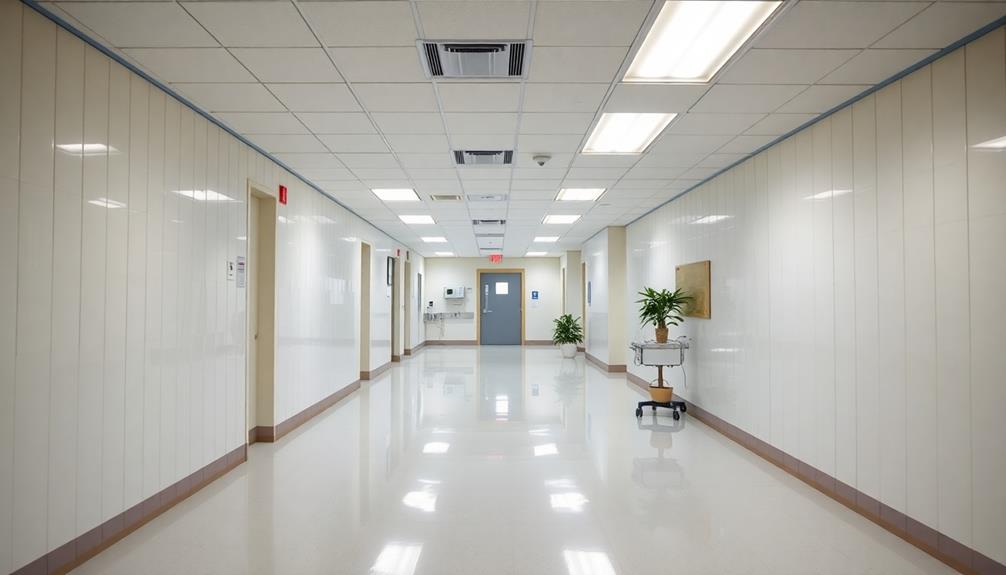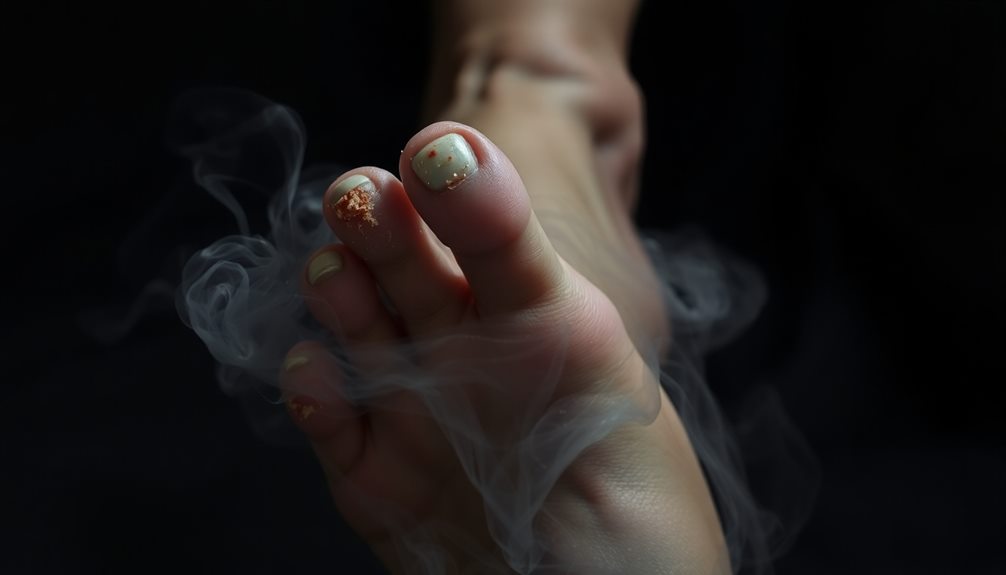When you walk into a hospital, you'll notice a strong mix of scents. It often smells like antiseptics, which are used to keep everything sterile and safe. You might catch whiffs of bodily odors from patients and the distinct smells of medical supplies like bandages or tools. In operating rooms, you could even encounter the unique scents related to surgeries. While some odors can be uncomfortable, they remind us of the important care being provided. So, if you're curious about how these smells affect both patients and staff, there's plenty more fascinating information to explore!
Key Takeaways
- Hospitals emit strong antiseptic odors from cleaning products, primarily isopropyl alcohol, essential for maintaining sterility.
- Surgical areas have distinct smells associated with procedures, including the scent of human flesh and sterile medical supplies.
- Patient care areas may have unpleasant odors from bodily fluids and human excretions, contributing to the overall hospital aroma.
- Food service areas introduce cooking smells, while waste disposal areas emit odors from biohazardous materials.
- Effective ventilation and air purification systems are crucial for managing and reducing unpleasant hospital smells.
Introduction
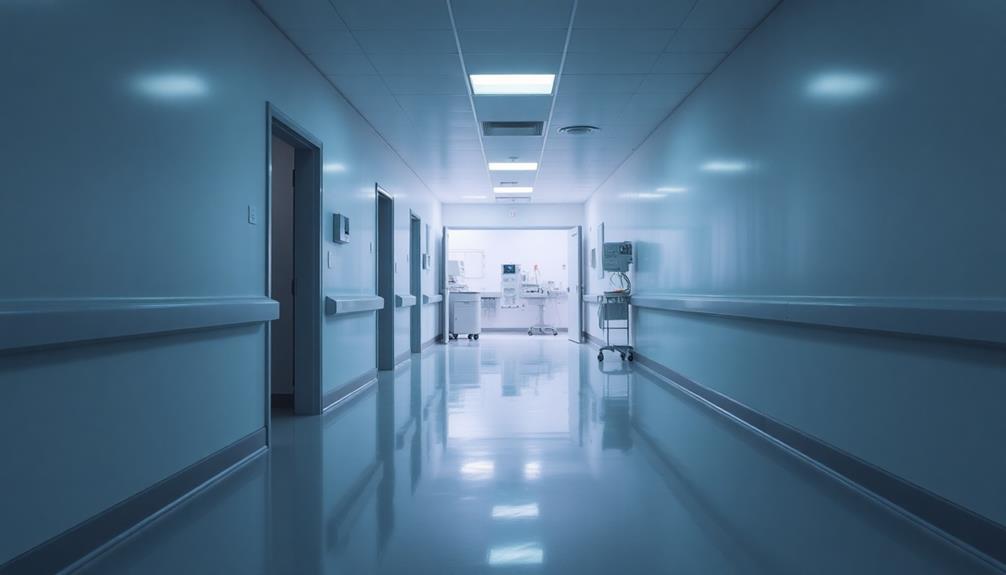
When you step into a hospital, its distinctive smell hits you almost immediately. It's a mix of strong antiseptic odors from cleaning products like isopropyl alcohol and disinfectants. These scents are crucial for patient care since they help keep everything sterile and safe.
You might also notice other smells, like body odors and medical supplies, that add to the overall aroma. Surgical procedures introduce even more specific scents, including the smell of human flesh, which can be surprising. Medications and sterilization processes contribute their own aromas too.
All these factors create a complex olfactory environment that influences how patients and staff feel about being there. The design of the hospital and its ventilation systems also plays a big role in how strong these smells are. A well-ventilated space can make things feel cleaner and more comfortable.
Understanding this unique smell helps you appreciate the importance of patient care and the efforts made to create a safe environment. So, next time you walk into a hospital, remember all the different scents working together to keep everyone healthy and protected!
Description of the Smell

The smell of a hospital is unmistakable and often overwhelming. As you walk through the hallways, you might first notice the strong scent of antiseptics, like isopropyl alcohol and disinfectants. These cleaning products are crucial for keeping patient rooms sterile.
However, you may also catch whiffs of something less pleasant. Bodily fluids from patients, especially those with infections, can create intense odors that linger in the air.
If you venture near surgical areas, you might experience unique smells associated with human flesh, reminding you of the realities of medical care. The medications given to patients add their own distinct aromas, contributing to the complex scent profile.
Environmental factors play a big role in how these smells mix together. Hospital design and ventilation systems can either amplify these scents or help keep them under control.
When you step into a patient room, you'll likely notice a blend of all these odors, creating a unique atmosphere that's both clinical and, at times, unsettling. Understanding these smells can help you feel more prepared as you navigate the hospital environment, appreciating the efforts made to maintain a safe and clean space for everyone.
Source and Composition
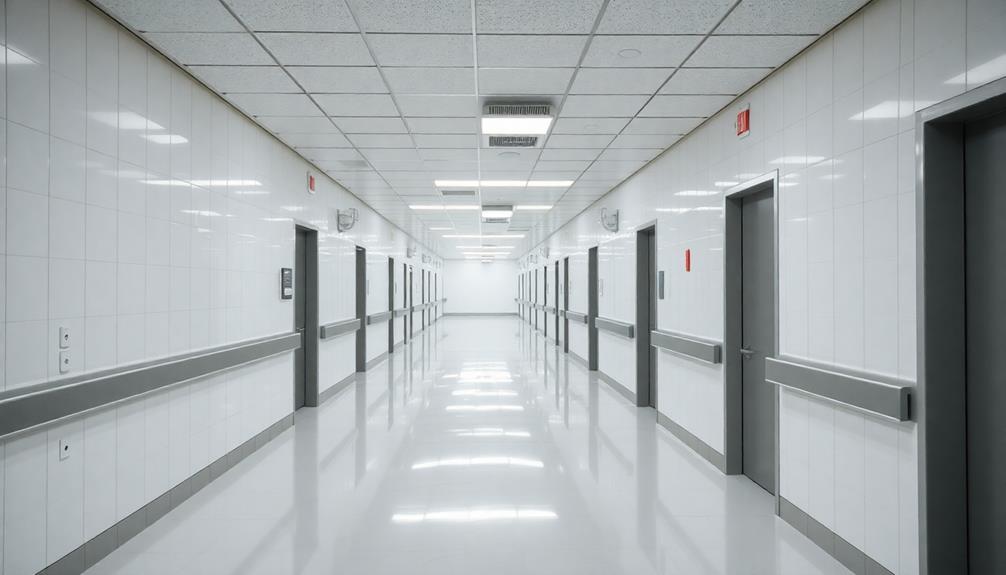
Understanding the source and composition of hospital smells reveals how various elements come together to create that distinctive environment.
When you walk into a hospital, you might first notice the sharp scent of antiseptic cleaning products, like isopropyl alcohol and disinfectants. These are crucial for keeping everything sterile, especially for the safety of patients.
Sterile medical supplies, such as bandages and surgical instruments, add another layer to this unique smell. Additionally, human factors play a role; body odors, excretions, and medications also contribute to the overall scent experience.
You might even catch a whiff of specific odors released during surgical procedures, which can evoke strong emotional responses.
Environmental factors, including how the hospital is designed and its ventilation systems, can either amplify or lessen these various odors. This affects not just the atmosphere but also the comfort of patients and staff.
Together, these elements create a complex bouquet of smells that make hospitals distinctly recognizable.
Typical Scenarios or Environments
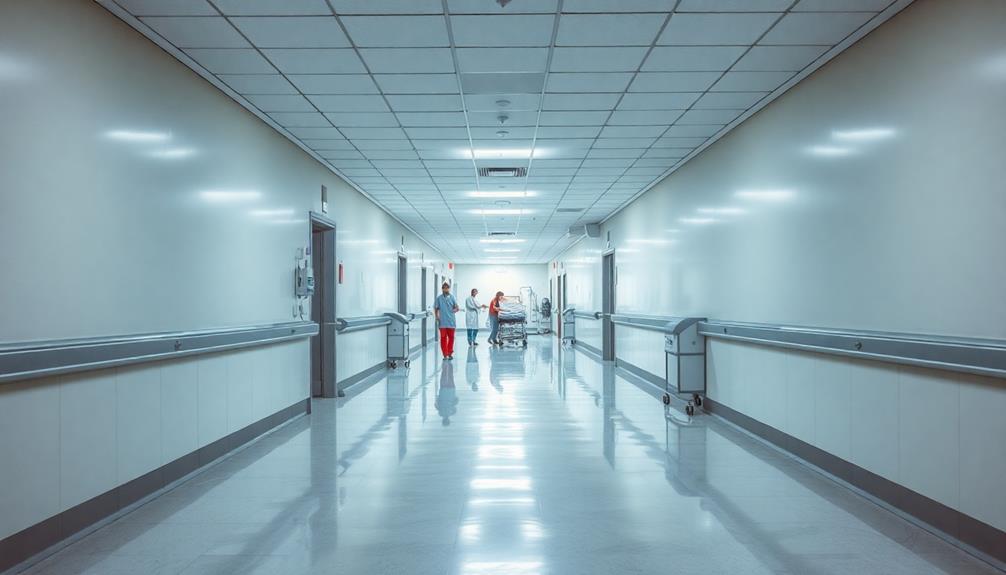
Walking through a hospital, you're likely to encounter a variety of smells that reflect the different scenarios and environments within. The sharp scent of antiseptic often lingers in the air, mingling with the occasional whiff of sterilized equipment. In certain areas, like the ICU or surgery wings, the atmosphere can carry a faint metallic or chemical odor, not unlike what refrigerant smells like in a maintenance room. These contrasting smells serve as constant reminders of the many life-saving procedures and treatments occurring within the hospital walls.
First, the strong antiseptic odor from cleaning products like isopropyl alcohol fills the air. This scent is essential for keeping everything clean and sterile.
As you move through the corridors, you might also catch a whiff of medical supplies. Sterile bandages and surgical tools give off their unique smells, adding to the hospital's atmosphere.
In patient care areas, you might notice less pleasant odors related to human excretions, especially when infections are involved. This is a part of daily life in hospitals.
When you approach an operating room, the scent might change again, revealing the distinct smells that come from surgical procedures. These include the complex smells from human flesh, reminding you of the resilience of healthcare workers.
In some areas, you might even find essential oils being used to create a calming environment. These scents can help balance the stronger odors around you.
Each of these smells contributes to the overall experience of being in a hospital, making it a unique environment.
Emotional or Cultural Associations

Evoking a complex mix of emotions, the distinct smells of hospitals can shape your perceptions and experiences profoundly. When you walk into a hospital, the strong scents of antiseptics and cleaning agents might make you feel vulnerable or even scared.
If you've had tough experiences there before, those smells can bring back memories that affect your mental health. You might remember a time when you felt worried or sad, and that can change how you feel during your next visit.
Cultural beliefs also play a big role in how you react to these smells. Some people find the strong scents comforting, thinking they mean the place is clean and safe. Others might feel stressed out by them. It's all about what those smells remind you of.
For instance, certain scents might bring back happy memories of a birth or sad ones of a loss, creating complicated feelings.
Research shows that adding pleasant or comforting smells can help improve your mood and satisfaction in hospitals. Understanding these emotional and cultural associations can help you navigate your feelings better, making your hospital visits a little less daunting.
Health or Safety Considerations

While the distinct odors in hospitals can stir up powerful emotions, they also serve critical health and safety purposes. You might notice a sharp scent of antiseptics when you enter. This smell isn't just strong; it plays a vital role in keeping the environment sterile. It helps prevent the spread of infections like MRSA and C-difficile.
You may also encounter unpleasant smells from bodily fluids, which can impact how comfortable you feel. Hospitals work hard to ensure effective air circulation and ventilation so odors don't linger. This helps create a healthier space for both patients and staff.
However, it's important to know that chemical odors from cleaning products can sometimes affect people with respiratory issues. That's why hospitals are now looking for safer alternatives to these strong cleaners.
To enhance the atmosphere, some facilities are even using essential oil diffusers and introducing plants. These natural scents can improve air quality and create a more welcoming environment.
Final Thoughts

The unique smells of hospitals are more than just an olfactory curiosity; they reflect the ongoing commitment to health and safety in these environments. When you walk into a hospital, you might notice a mix of antiseptic scents from cleaning products, sterile medical supplies, and even the smell of human bodily fluids.
These odors can stir up strong feelings, reminding you of the seriousness of care provided by healthcare workers. Cleaning agents like isopropyl alcohol help create that sharp, clean smell, showing how important cleanliness is for keeping everyone safe.
However, sometimes, unpleasant odors from infections can make the atmosphere uncomfortable. That's where the hospital's ventilation system comes in. It's designed to keep the air fresh and reduce those strong smells, helping you and the healthcare workers breathe easier.
Frequently Asked Questions
How Do You Describe the Smell of a Hospital?
You might describe the smell of a hospital as a blend of antiseptic, sterile supplies, and faint human scents. It's both clinical and unsettling, evoking emotions tied to healing and the fragility of life.
Do Hospitals Smell Like Antiseptic?
Yes, hospitals do smell like antiseptic. You'll notice a strong, clean scent when you enter. It's a combination of disinfectants, cleaning products, and sometimes less pleasant odors, all aimed at maintaining a sterile environment.
What Do Hospital Waiting Rooms Smell Like?
When you step into a hospital waiting room, you'll notice a mix of antiseptic scents, faint artificial fragrances, and the occasional whiff of coffee. It's a unique blend that can feel both clinical and oddly comforting.
What Does ICU Smell Like?
In the ICU, you'll notice strong antiseptic scents mixed with sterile supplies and the faint odors of medications. Occasionally, you might catch unpleasant whiffs from bodily fluids, creating a complex and distinctive aroma around you.
